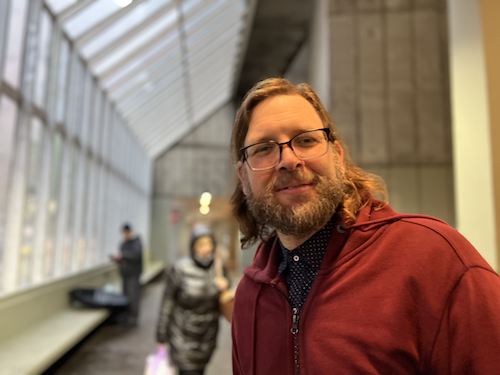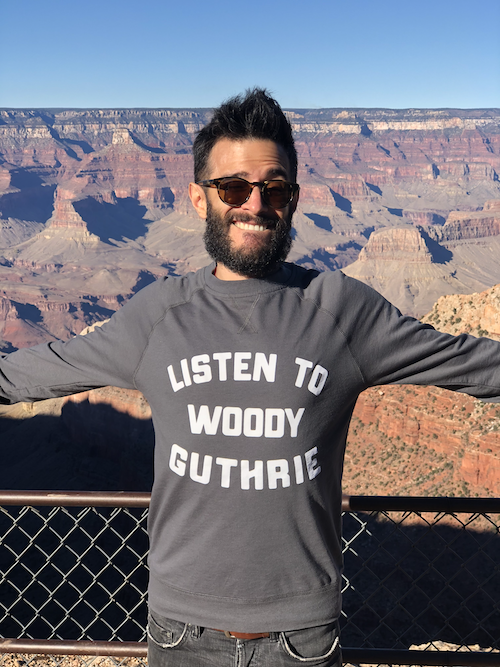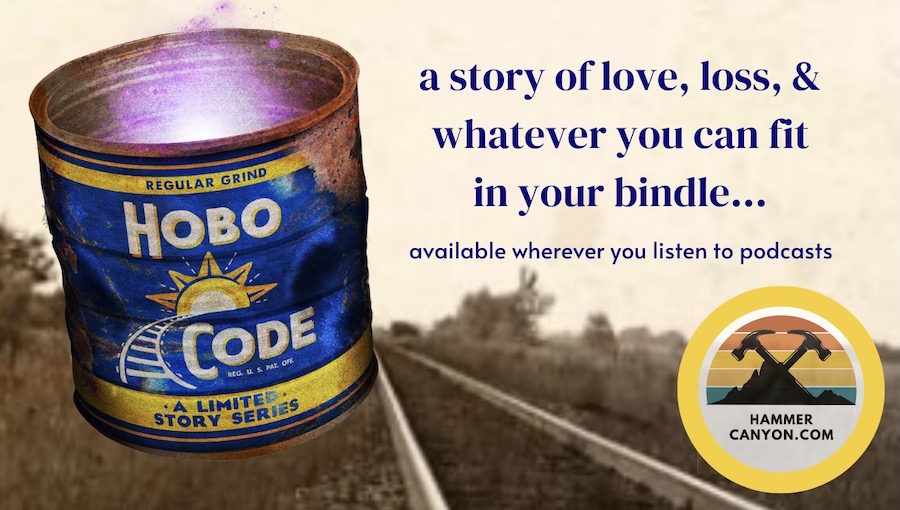The following is an interview with Paul Pakler (co-host, Paul and Corey Cross the Streams) and Daytime Emmy-nominated writer Shane Portman (Tumble Leaf, Shape Island) regarding the recent release of their original, 4-part audio drama, Hobo Code. In this interview, Fanbase Press Editor-in-Chief Barbra Dillon chats with Pakler and Portman about their shared creative process in bringing the world and characters to life, the incredible cast and crew involved with the production, and more!
Barbra Dillon, Fanbase Press Editor-in-Chief: Congratulations on the release of Hobo Code! For those who may be unfamiliar, how would you describe the series’ premise, and what was its inspiration?
Paul Pakler: Thank you! We are very excited to be able to share this story.
Hobo Code is a four-part limited audio series. In 1934, a little girl – Elizabeth “Buts” Wyland – enlists the help of two hobos – Gadabout Jack and Brother Isaac – in order to run away from her aunt and uncle’s Alabama farm to find her parents in California. But Hobo Code also jumps around in time in order to examine other moments in these characters’ lives. It’s an epic journey spanning from the Roaring Twenties to the Great Depression, all the way to the Great Recession of 2008.
Shane Portman: Inspiration-wise, we really wanted to explore the idea of home. What it means to have one, what it means not to have one, and what the repercussions are from losing your home. Each of these characters are on their own journey in relation to those themes.

BD: The production process for a scripted audio drama is no easy feat. What can you tell us about your shared creative process in bringing the script and characters to life on the page, even prior to the recording process?
SJP: We were carrying these characters around in some iteration or another in our heads for years before a story materialized that felt right and nourishing for Buts, Jack, and Isaac. We spent a lot of time just building backstories – some of which stayed and some of which fell away as the characters grew. And, as the characters grew, the story started to reveal itself. And Paul and I are both research junkies. So, we dove into books that dealt with the times and the themes of Hobo Code to try and build as full a world as possible for our trio to live in. Then, once we had scripts that we loved, we would have a read-through to hear it out loud. And that led us to see holes that were missing. The first read-through led to some major changes and each subsequent read-through tightened Hobo Code up even more until it felt ready to record.
PWP: And not just books! Films, shows, and music also gave us more context for the times, narrative, or character ideas, and even the syntax a particular character might use.
Shane and I started this as an opportunity to both say “all the things” we’d love to say in a piece of art and to work on a project we’d never get bored with. From start to finish, Hobo Code was always something we were excited to jump on a call to work on together.
SJP: And we really should shine a spotlight on Joey Scarillo and Genevieve Gearity from Tetra Stories. For a while, we were really just building these characters and this world in a nebulous place – like a really lovely nebulous place but nebulous just the same. We hadn’t even picked a medium to tell Hobo Code in. We were just enjoying the process of building. But, we were connected to Joey via a mutual friend. He and Genevieve had just created Tetra with a mandate to produce four-part stories and were looking for their first slate of podcasts to produce. We pitched them Hobo Code and they immediately connected with it and we with them. That’s really what got us started focusing all our character and world building into a podcast series. Their four-part-story model even inspired the narrative structure of our series, because we just so happened to have four main characters. So, we built each episode around a different character’s specific POV from a time before or after the central story. Then, when the pandemic hit, we all locked down and re-evaluated what we were capable of doing in the current climate. We wound up parting ways with Tetra in the most mutual and friendliest of terms. They’re still wonderfully supportive of us, and we think everyone should check out their new release The Box!
BD: You have a Murderers’ Row of talented voice cast involved with the series! What was your approach to the casting, and what can you tell us about your work with the cast throughout the recording of the production?

PWP: We’ve been incredibly lucky and fortunate with the actors who have shared their time and talents with us.
One of the major hurdles we had to surmount was the sheer number of characters we’d written. Hobo Code has a couple dozen or so separate characters, and with our budget we knew that we’d have to cast actors into multiple roles. Then, working within the medium of audio drama, we also knew that we’d have to look for dynamic voices so that the audience would never be confused as to who was speaking and to whom. We ended up looking for two types of actors: those who either had chameleon-like voices or incredibly singular ones.
SJP: We were truly grateful for the way our cast breathed life into their characters. We recorded in New York and Los Angeles. And, while recording can often be an isolating experience for a voice actor, our sound engineers (Kevin Cleland in LA and Erik Nyquist in NYC) were able to create setups for our actors so they could record a scene together in real time. There’s nothing like that energy of intuitive response and I feel like we were able to capture a lot of that energy.
BD: An element of all audio dramas that should not be overlooked is the score. What can you share with us about the creators and musicians involved with the score of Hobo Code?
SJP: Paul and I were soooo excited about the score for Hobo Code. We’re both fans of blues, folk, and roots music. And we knew as we were writing that music was going to be its own character in this series. Initially, we had specific songs that we wanted to use but the cost of the rights was an issue. And, once we were ready to move into production, our composer Maesa Pullman was one of the first people we brought into the fold. With the exception of two songs that we found in the public domain, she created a full score of original music that went above and sky-high beyond to paint the world of Hobo Code in gorgeous music. Some of the giddiest moments from the entire production were when we’d hear a song for the first time. Maesa and the team of musicians she assembled (a special tip of the hat to her engineer Jason Hiller, Maesa’s partner in music and life) were/are an absolute gift to Hobo Code.
PWP: Maesa and Jason are putting the finishing touches on and will be putting out the official Hobo Code soundtrack soon – make sure to follow us on social media for updates on its release!
BD: Are there any upcoming projects on which you are currently working that you would like to share with our readers?
PWP: Sleep (lolol). The film-review podcast I co-host, Paul and Corey Cross the Streams, is currently in its sixth season. To give the elevator pitch: PACCTS is the great American podcast where two friends learn about life as they float down the river of streaming services.
This year, we are reviewing selections from the 2022 critics’ Sight and Sound Poll of the greatest films of all time. You can find this and previous seasons on Fanbase Press and anywhere you listen to podcasts.
SJP: I second the sleep! I don’t have anything on the immediate horizon.
BD: Lastly, what is the best way for our readers to find more information about Hobo Code and your other work?
SJP: You can find Hobo Code on all the usual podcast hubs (Spotify, Apple Podcasts, etc.) and on the socials (@hobocodepod on Instagram, @hammercanyon on Twitter, Hammer Canyon on Facebook, and @ HammerCanyon on YouTube). I’ve got a semi-regularly updated personal website at shaneportman.com where you can find other things I’m working on.
PWP: You can find me on Twitter (@paulpakler) and on Letterboxd @notwallaceshawn (because I’m not).

